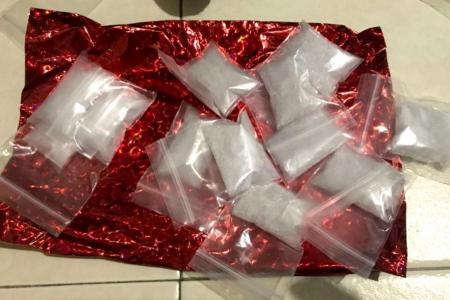Over 70 per cent of those in prison are there drug offenders
High number of such offenders in prisons and DRCs due to Singapore's tough stand on drugs, say experts
She spent more than 20 years in and out of prison and drug rehabilitation centres (DRCs) for drug consumption and trafficking.
The 53-year-old mother of four, whom we shall call Nina, told The New Paper she got hooked on drugs at 25 while she was married to her first husband.
She ended up one of the many drug abusers in Singapore's penal system after using a range of illegal drugs including heroin, ketamine and marijuana.
Nina was released from prison in 2015.
Singapore Prison Service (SPS) statistics show that 73.6 per cent of the 10,245 inmates in prison and DRCs last year had committed drug-related offences.
The Central Narcotics Bureau (CNB) said it arrested a total of 3,091 drug abusers and seized drugs with an estimated street value of about $6.63 million last year.
CNB said methamphetamine, or Ice, and heroin remain the two most commonly abused drugs in Singapore.
Last year, 64 per cent of those arrested had abused Ice, and 27 per cent were heroin abusers. Cannabis was the third-most abused drug, with 7 per cent of users.
The 22.18kg of Ice seized last year was a 21 per cent rise from the 18.27kg in 2016.
But the 36.92kg of heroin seized dropped 30 per cent from 2016, and cannabis seizures fell 18 per cent to 44.05kg.
CNB said the regional and global drug situations remain challenging, with the 64 tonnes of methamphetamine seized in East and South-east Asia in 2015 making up a third of total global seizures and the largest proportion among all regions.
While the drug situation was stable last year, CNB noted two concerns - a high 40 per cent of arrests were of new abusers, and 64 per cent, or nearly two-thirds, of the new abusers were below the age of 30.
Sociologist Tan Ern Ser, an associate professor in the National University of Singapore, told TNP that the number of abusers would be even higher if not for Singapore's tough stand on drugs.
The fact that drug offenders make up a high proportion of inmates in the penal system is due primarily to effective enforcement by the authorities, he added.
Agreeing, psychologist Lawrence Tan said Singapore's zero-tolerance policy on drugs resulted in the high number of drug offenders behind bars.
A contributing factor was the high level of re-offending caused by the nature of addiction, he added.
"Addiction is a chronic and relapsing disease. In the first year of recovery, the chances of relapsing can go up to as high as 70 per cent to 80 per cent," said Mr Tan, adding the longer an addict stretches out the period of abstinence, the lower the risk.
In a 2015/16 survey, the National Council Against Drug Abuse found that while most respondents supported Singapore's zero-tolerance approach, a growing number of young people displayed more liberal attitudes towards drugs.
Experts said this could be a possible reason behind the number of young drug offenders.
Mr Tan said young people might not have a fully developed pre-frontal cortex, the part of the brain associated with decision- making, and so might be more susceptible to issues such as peer pressure.
Get The New Paper on your phone with the free TNP app. Download from the Apple App Store or Google Play Store now



